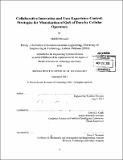| dc.contributor.advisor | David D. Clark. | en_US |
| dc.contributor.author | Hussain, Mohibi | en_US |
| dc.contributor.other | Massachusetts Institute of Technology. Technology and Policy Program. | en_US |
| dc.date.accessioned | 2014-04-25T15:48:08Z | |
| dc.date.available | 2014-04-25T15:48:08Z | |
| dc.date.copyright | 2013 | en_US |
| dc.date.issued | 2013 | en_US |
| dc.identifier.uri | http://hdl.handle.net/1721.1/86272 | |
| dc.description | Thesis: S.M. in Technology and Policy, Massachusetts Institute of Technology, Engineering Systems Division, Technology and Policy Program, 2013. | en_US |
| dc.description | Cataloged from PDF version of thesis. | en_US |
| dc.description | Includes bibliographical references (pages 111-122). | en_US |
| dc.description.abstract | Monetization of Quality of Service (QoS) for Mobile Data is the prioritization and segregation of mobile data and charging based on the level of traffic prioritization. The monetization of QoS of data can be managed by traffic management and performance optimization policies. This traffic prioritization can be application specific as well as application agnostic, but essentially based on user choice and in compliance with Net Neutrality principles. The mobile operators' quest to evolve from their "dumb bit pipe" role to become more involved in shaping the user experience through collaborative innovation with application developers and content providers is the main driver behind this concept. Three case studies, have been evaluated in this thesis, namely 1) zero.facebook.com, where Facebook collaborates with mobile operators across the world to bundle a stripped down Facebook application version with a mobile connection, 2) collaboration between Google Voice and Sprint where Sprint is adding Over The Top Google Voice minutes to its mobile plans, and 3) NTT DoCoMo's i-mode, which served as a revolutionary concept in the mobile services, as a traditional mobile operator reshaped the consumer experience through customized service offerings and by getting involved in almost all sectors of the telecommunication value chain. The common parameters identified in these case studies, combined with the findings of interviews with over fifty stakeholders across the telecommunications value chain, have been brought together in the aggregated model presented in this thesis; "collaborative innovation" and "user experience control" are identified as two significant factors driving the rationale behind monetization of QoS of mobile data. The regulatory concerns, technological aspects, and future scope of this concept are also discussed in this thesis. | en_US |
| dc.description.statementofresponsibility | by Mohibi Hussain. | en_US |
| dc.format.extent | 122 pages | en_US |
| dc.language.iso | eng | en_US |
| dc.publisher | Massachusetts Institute of Technology | en_US |
| dc.rights | M.I.T. theses are protected by copyright. They may be viewed from this source for any purpose, but reproduction or distribution in any format is prohibited without written permission. See provided URL for inquiries about permission. | en_US |
| dc.rights.uri | http://dspace.mit.edu/handle/1721.1/7582 | en_US |
| dc.subject | Engineering Systems Division. | en_US |
| dc.subject | Technology and Policy Program. | en_US |
| dc.title | Collaborative innovation and user experience control-strategies for monetization of QoS of data by cellular operators | en_US |
| dc.type | Thesis | en_US |
| dc.description.degree | S.M. in Technology and Policy | en_US |
| dc.contributor.department | Massachusetts Institute of Technology. Engineering Systems Division | |
| dc.contributor.department | Technology and Policy Program | |
| dc.identifier.oclc | 874575353 | en_US |
